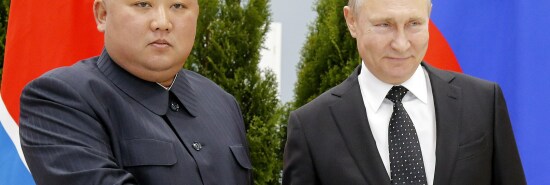
Putin’s nuclear messaging to the West
Jon Sweet Mark Toth
Video Embed
Wednesday’s summit between Russian President Vladimir Putin and North Korean leader Kim Jong Un at the Vostochny Cosmodrome had an ominous undertone. It was not just about Russia’s need for weapons and munitions. It was also Putin playing a North Korean nuclear wild card against the United States and its allies in the Pacific.
Without doubt, the two nations are working on a deal that would provide military assistance to the Kremlin, namely artillery, anti-tank missiles, and potentially 100,000 volunteers to fill Russian trenches. But the Russian technology given to Pyongyang, in return, poses an even bigger threat to the U.S., South Korea, and Japan.
DEMOCRATS DON’T SEEM EAGER TO DEFEND HARRIS AHEAD OF 2024
Ukrainian Defense Intelligence Chief Kyrylo Budanov claimed North Korea has already provided Russia with 122 mm and 152 mm artillery ammunition for over a month now. That was likely the result of Russian Defense Minister Sergei Shoigu’s travel to Pyongyang in July to attend the celebration of North Korea’s 70th anniversary of “Victory Day.”
Putin’s meeting was likely about how Russian technology can advance North Korea’s military satellite and nuclear-powered submarine capabilities alongside its nuclear and missile programs. The not-so-subtle location of the meeting, the Vostochny Cosmodrome in Russia’s Amur region, tells us all we need to know.
Symbolic? Absolutely.
The Russian facility was built in 2016 to enable the Kremlin to achieve Moscow’s military and commercial space ambitions. Senior lawmaker Irina Yarovaya described the spaceport as a “21st-century space launch facility and a new philosophy of modern Russia. It means that irrespective of anybody’s political will, we can launch any spacecraft to any space orbits independently.”
Despite the failed Luna 25 spacecraft attempt to plant the Russian flag on the moon’s south pole, the complex remains a treasure trove of scientific knowledge on jet propulsion, terminal guidance systems, and much more.
As Ukraine’s counteroffensive gains momentum and the Russian military’s hold on the Crimean Peninsula is in doubt, Putin is looking for a game-changing way to retrieve his faltering “special military operation.”
Partnering with Kim Jong Un’s North Korea for military assistance is one way out. By creating a Pyongyang nuclear wild card, Putin seeks to turn his present weakness in Ukraine into a position of strength.
The meeting and its location were a well-planned event intended to telegraph a nuclear message to the U.S. It may have worked, too. The White House is reportedly wavering on supplying Ukraine with ATACMS missiles.
Putin may be trying to de-escalate the war in Ukraine by threatening a nuclear confrontation in the Pacific. While the U.S. has been able to “weaken Russia” in Ukraine by providing weapons, ammunition, and intelligence, the threat of transferring critical technology to enable a nuclear-capable North Korea to strike the U.S. may be enough to get the Biden administration and NATO to force Ukraine to the negotiation table.
While Putin, his national propagandists, and Dmitry Medvedev, former president and current deputy chairman of the Security Council of Russia, have all threatened the use of nuclear weapons against Ukraine and the West, Washington knows Kim Jong Un would be the one most likely to employ them. The White House needs a counter — and fast.
The threat of nuclear escalation has once again risen to the occasion. A desperate Putin appears to be willing to hand the keys to the kingdom over to North Korea to save himself and his “empire.” But unlike storing tactical nuclear weapons in Belarus, once Putin transfers the technology to Kim Jong Un, he relinquishes control.
Things likely just got radioactive.
CLICK HERE TO READ MORE FROM THE WASHINGTON EXAMINER
Jonathan Sweet, a retired Army colonel and 30-year military intelligence officer, led the U.S. European Command Intelligence Engagement Division from 2012 to 2014. Mark Toth is an economist, entrepreneur, and former board member of the World Trade Center, St. Louis.
